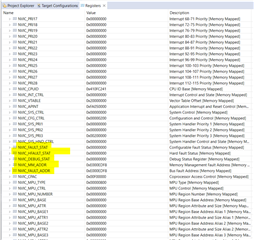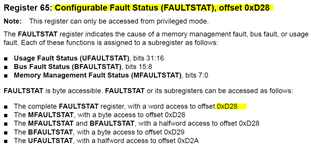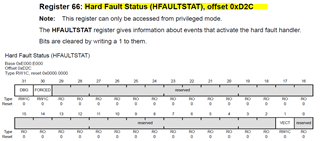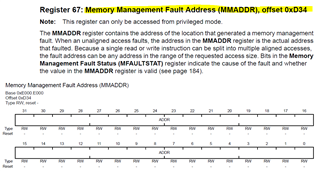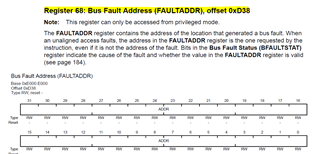Part Number: TM4C1290NCPDT
Many years ago someone at TI sent me routines that allowed me to query the registers that enabled me to determine the source of a hard fault, its code was:
// HardFaultHandler_C:
//
// This is called from the HardFault_HandlerAsm with a pointer the Fault stack
// as the parameter. We can then read the values from the stack and place them
// into local variables for ease of reading.
// We then read the various Fault Status and Address Registers to help decode
// cause of the fault.
// The function ends with a BKPT instruction to force control back into the debugger
void HardFault_HandlerC(unsigned long *hardfault_args) {
volatile unsigned long stacked_r0 ;
volatile unsigned long stacked_r1 ;
volatile unsigned long stacked_r2 ;
volatile unsigned long stacked_r3 ;
volatile unsigned long stacked_r12 ;
volatile unsigned long stacked_lr ;
volatile unsigned long stacked_pc ;
volatile unsigned long stacked_psr ;
volatile unsigned long _CFSR ;
volatile unsigned long _HFSR ;
// volatile unsigned long _DFSR ; // Not on our CPU
// volatile unsigned long _AFSR ; // Not on our CPU
volatile unsigned long _BFAR ;
volatile unsigned long _MMAR ;
stacked_r0 = ((unsigned long)hardfault_args[0]) ;
stacked_r1 = ((unsigned long)hardfault_args[1]) ;
stacked_r2 = ((unsigned long)hardfault_args[2]) ;
stacked_r3 = ((unsigned long)hardfault_args[3]) ;
stacked_r12 = ((unsigned long)hardfault_args[4]) ;
stacked_lr = ((unsigned long)hardfault_args[5]) ;
stacked_pc = ((unsigned long)hardfault_args[6]) ;
stacked_psr = ((unsigned long)hardfault_args[7]) ;
// Configurable Fault Status Register
// Consists of MMSR, BFSR and UFSR
_CFSR = (*((volatile unsigned long *)(0xE000ED28))) ;
// Hard Fault Status Register
_HFSR = (*((volatile unsigned long *)(0xE000ED2C))) ;
// Debug Fault Status Register
// _DFSR = (*((volatile unsigned long *)(0xE000ED30))) ; Doesn't exist on our CPU.
// Auxiliary Fault Status Register
// _AFSR = (*((volatile unsigned long *)(0xE000ED3C))) ; Doesn't exist on our CPU.
// Read the Fault Address Registers. These may not contain valid values.
// Check BFARVALID/MMARVALID to see if they are valid values
// MemManage Fault Address Register
_MMAR = (*((volatile unsigned long *)(0xE000ED34))) ;
// Bus Fault Address Register
_BFAR = (*((volatile unsigned long *)(0xE000ED38))) ;
__asm("BKPT #0\n") ; // Break into the debugger
}
Is there something like this for my current MPU?
Thanks, Doug


